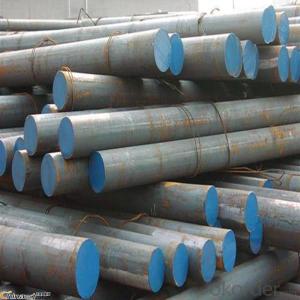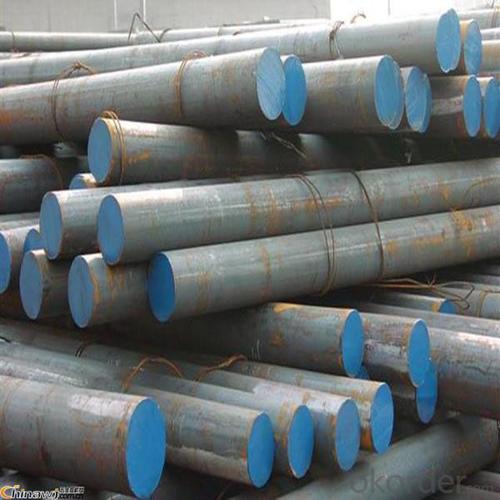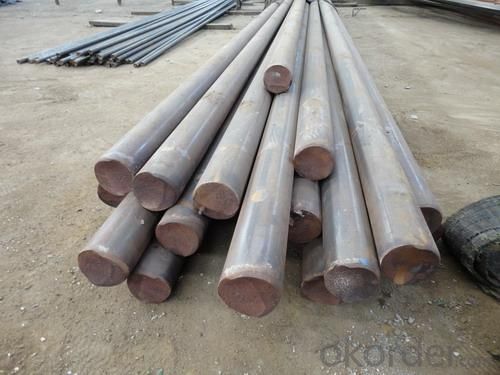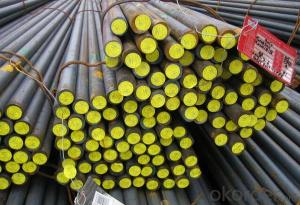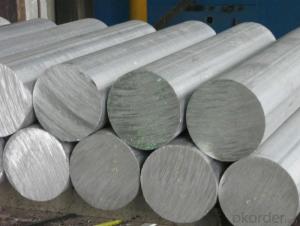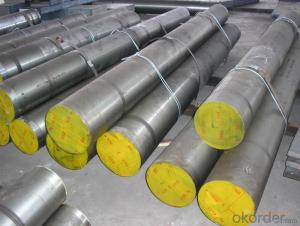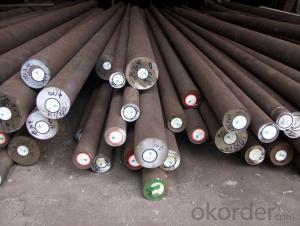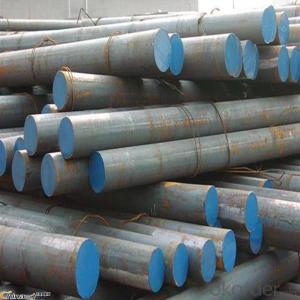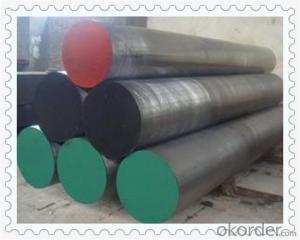SAE 4140 4150 4340 Alloy Steel Round Steel Bar
- Loading Port:
- China main port
- Payment Terms:
- TT OR LC
- Min Order Qty:
- 30 m.t.
- Supply Capability:
- 10000 m.t./month
OKorder Service Pledge
OKorder Financial Service
You Might Also Like
Specification
SAE 4140 4150 4340 Alloy Steel Round Steel Bar
Product Information:
1.Grade:SAE8620 SNCM220 805M20 4150 4140 4130 EN24 4340
2.Size: 12mm-300mm
3.Standard Performed: ASTM A29/A29M-04
4.Quality: AISI8620
Chemical Composition(%)
| Grade | C | Si | Mn | P | S | Cr | Ni | Mo |
| 8620 | 0.18-0.23 | 0.15-0.35 | 0.70-0.90 | Max 0.035 | Max 0.035 | 0.40-0.60 | 0.40-0.70 | 0.15-0.25 |
Product Overviews:
| Product Name | Typical Grades | Diameter(mm) | Standard adopted |
| Carbon Steel | 20 (1020/S20C/C22) | Ø16-Ø300 | GB/SAE/JIS/DIN |
| 40 (1040/S40C/C40) | |||
| 45 (1045/S45C/C45) | |||
| Bearing Steel | GCr9 (51100/SUJ1) | Ø12-Ø250 | |
| GCr15 (52100/SUJ2/100Gr6) | |||
| GCr9SiMn (A485-Gr.1/SUJ3) | |||
| Cr-Mo Steel | 20Cr (5120/SCr420H/20Cr4) | Ø12-Ø250 | |
| 40Cr (5140/SCr440/41Cr4) | |||
| 42CrMo(4140/SCM440/42CrMo4) | |||
| Gear Steel | 20CrNiMo | Ø16-Ø600 | |
| 20CrMn(5115/SMnC420/20MnCr5) | |||
| 20CrNiMo(8620/SNCM220/20CrMiMo2) |
Product Show:

Our Advantages:
· Industry experience over 20 years.
· Shipment of goods -More than 70 countries worldwide.
· The most convenient transport and prompt delivery.
· Competitive price with best service.
· High technical production line with top quality products.
· High reputation based on best quality products.
With our experienced, enthusiastic and dynamic staffs, we assure to bring you the products with best quality, reasonable prices and good after-sales services under the motto: Friends First, Business After.
Communication, Experience, Expertise and Best efforts are our Promises to you.
- Q: What are the different case hardening grades of special steel?
- Special steel offers a variety of case hardening grades, each with its own distinct properties and uses. Some of the commonly employed grades are: 1. 8620: This grade is commonly utilized for high-stress applications like gears and shafts. Its remarkable toughness and resistance to wear make it ideal for parts requiring both durability and strength. 2. 9310: Aerospace applications often rely on this grade due to its high strength and resistance to fatigue. It is frequently employed for gears, bearings, and components demanding exceptional toughness and load-carrying capacity. 3. 4340: Known for its hardenability and high strength, this grade is suitable for parts necessitating great tensile strength and impact resistance, such as crankshafts, connecting rods, and gears. 4. 20MnCr5: This grade finds frequent use in the production of gears, camshafts, and components requiring high surface hardness and resistance to wear. It boasts excellent case-hardening properties and good core strength. 5. EN36C (also referred to as 655M13): This grade is commonly employed for axles, shafts, and crankshafts requiring high tensile strength. Its good hardenability and exceptional toughness make it suitable for heavy-duty applications. To ensure the right grade is chosen for a specific project, it is crucial to consider the application requirements, including desired hardness, strength, and wear resistance. Seeking advice from a metallurgist or materials science expert can aid in selecting the appropriate case hardening grade.
- Q: What are the main factors affecting the cost of special steel?
- The main factors affecting the cost of special steel include the cost of raw materials, such as iron ore and other alloying elements, as well as the cost of energy required for the manufacturing process. Other factors include the complexity of production methods, the level of demand and supply in the market, transportation costs, and any additional costs associated with quality control and compliance with industry standards.
- Q: What are the different quality control measures for special steel production?
- There are several quality control measures for special steel production, including thorough material inspections, precise chemical composition analysis, stringent dimensional and shape control, non-destructive testing methods such as ultrasonic and magnetic particle inspections, and rigorous mechanical property evaluations. Additionally, heat treatment processes and surface treatments are closely monitored to ensure the desired properties and surface finish of the special steel. Continuous monitoring and quality checks are essential throughout the production process to maintain the highest standards and meet customer requirements.
- Q: What are the different methods of preventing hydrogen-induced cracking in special steel?
- There are several methods to prevent hydrogen-induced cracking in special steel. One common approach is to use preheating techniques, which involve heating the steel before welding to reduce hydrogen levels and minimize the risk of cracking. Another method is to employ low-hydrogen welding consumables, such as low-hydrogen electrodes or filler wires, which have reduced hydrogen content and can help prevent cracking. Additionally, post-weld heat treatments, such as stress relieving or tempering, can be implemented to remove residual hydrogen and relieve stress in the steel, reducing the chances of cracking. Proper cleaning and preparation of the steel surface, as well as controlling the welding parameters, are also crucial in preventing hydrogen-induced cracking.
- Q: What are the main characteristics of structural steel forgings?
- Structural steel forgings possess several key characteristics that make them ideal for various applications in construction and engineering. Firstly, one of the main characteristics of structural steel forgings is their exceptional strength and durability. Steel is known for its high tensile strength, which allows it to withstand heavy loads and resist deformation under stress. This makes structural steel forgings suitable for supporting large structures and withstanding dynamic forces such as wind or seismic activity. Another important characteristic is the versatility of structural steel forgings. Steel can be fabricated into a wide range of shapes and sizes, making it adaptable for different design requirements. It can be forged into complex shapes with intricate details, allowing for precise and customized components to be created. This versatility enables structural steel forgings to be used in a variety of applications, from beams and columns in buildings to bridges and offshore structures. Additionally, structural steel forgings have excellent weldability. Steel can be easily joined together using various welding techniques, allowing for the creation of strong and reliable connections. This enhances the overall structural integrity of steel components and ensures their longevity. Another key characteristic of structural steel forgings is their cost-effectiveness. Steel is one of the most economical construction materials due to its abundance, recyclability, and ease of manufacturing. The production process for steel forgings is efficient and can be scaled up to meet large-scale construction projects, making it a cost-effective choice for many applications. Furthermore, structural steel forgings are known for their resistance to corrosion. Steel can be treated with coatings or alloys to enhance its resistance to rust and other forms of corrosion. This makes it suitable for use in environments with high humidity, exposure to saltwater, or harsh weather conditions. In conclusion, the main characteristics of structural steel forgings are their exceptional strength, versatility, weldability, cost-effectiveness, and resistance to corrosion. These characteristics make structural steel forgings a preferred choice for various construction and engineering applications, providing durability, reliability, and longevity to structures.
- Q: How is special steel stored and transported?
- Special steel is stored and transported with utmost care to ensure its quality and integrity are maintained. Firstly, during storage, special steel is kept in a controlled environment with appropriate temperature and humidity levels to prevent any corrosion or damage. It is often stored in covered warehouses or storage facilities specifically designed for steel, offering protection from environmental factors such as rain, snow, and sunlight. When it comes to transportation, special steel is transported using various methods depending on the quantity and distance. For short distances, smaller quantities can be transported by trucks equipped with flatbeds or enclosed trailers. These trucks are designed to securely hold and protect the steel during transit, preventing any shifting or damage. However, for longer distances or larger quantities, special steel is often transported via rail or sea. Rail transportation ensures a smooth and stable journey, reducing the risk of damage due to vibrations or sudden movements. Steel is loaded onto specially designed railcars that provide secure storage and protection during transit. Sea transportation involves loading the steel onto shipping containers or directly onto specialized vessels. Containers are sealed and secured to prevent any movement or damage during the journey. Specialized vessels, such as roll-on/roll-off ships or heavy-lift vessels, are used for transporting oversized or extremely heavy steel components. In all cases, special steel is carefully packaged and secured using appropriate materials, such as wooden crates, steel strapping, or plastic wrapping, to prevent any scratches or dents. Additionally, the transportation process is closely monitored, and any necessary precautions are taken to ensure the steel arrives at its destination in optimal condition. Overall, the storage and transportation of special steel require meticulous planning, proper handling, and the use of specialized equipment to safeguard its quality and protect it from any potential damage or degradation.
- Q: How does special steel contribute to improved product aesthetics?
- Improved product aesthetics can be achieved through the use of special steel in various ways. Firstly, special steel can be manufactured with a higher level of precision and consistency compared to regular steel. This enables the production of products with smoother surfaces, sharper edges, and more intricate designs, resulting in a visually pleasing appearance. Furthermore, special steel can be enhanced visually through treatments or coatings. For instance, it can be polished to create a reflective surface, giving the product a luxurious and high-end look. Additionally, special steel can be coated with different colors or finishes, such as chrome or black oxide, to match specific design preferences and create a more visually striking appearance. Moreover, the superior strength and flexibility of special steel allow for unique shaping and forming possibilities. This empowers designers to create products with innovative and complex shapes, contributing to a distinct and eye-catching aesthetic. The ability to mold special steel into various forms also opens up opportunities for intricate patterns, textures, and embossed designs on the product's surface. Lastly, special steel offers excellent corrosion resistance and durability, which helps maintain the product's appearance over time. It prevents rust, staining, and other forms of deterioration that can negatively impact the visual appeal. This long-lasting aesthetic quality is particularly valuable for products exposed to harsh environments or requiring frequent handling. In conclusion, special steel significantly enhances product aesthetics through precision manufacturing, customizable surface treatments, unique shaping capabilities, and long-lasting visual appeal. These qualities allow for the creation of visually appealing products that excel in design, finish, and overall appeal.
- Q: How does special steel perform in high-vibration applications?
- Special steel is known for its excellent performance in high-vibration applications. Its unique composition and properties make it highly resistant to the effects of vibration, ensuring optimal performance and durability in such environments. One of the key features of special steel is its high tensile strength. This strength allows it to withstand the forces and stresses generated by vibration without undergoing deformation or failure. This property is vital in high-vibration applications, where constant movement and oscillation can subject materials to significant stress. Moreover, special steel exhibits exceptional fatigue strength, meaning it can endure repeated cycles of stress and vibration without compromising its structural integrity. This makes it ideal for applications that involve continuous or cyclic vibration, such as machinery, equipment, and structures subjected to dynamic loads. Additionally, special steel possesses excellent damping properties. Damping refers to the ability of a material to absorb and dissipate energy generated by vibrations. Special steel's superior damping characteristics help reduce the magnitude and duration of vibrations, minimizing the impact on the surrounding components and structures. This contributes to overall system stability and reduces the risk of fatigue or premature failure. Furthermore, special steel is often engineered to have high resistance to corrosion and wear. This resistance ensures that the material remains robust and reliable even in harsh environments where vibration-induced corrosion or erosion may occur. By maintaining its protective coating and integrity, special steel can effectively withstand the challenges posed by high-vibration applications. In summary, special steel performs exceptionally well in high-vibration applications due to its high tensile strength, fatigue resistance, damping properties, and corrosion/wear resistance. Its combination of these properties ensures optimal performance, longevity, and safety in environments characterized by significant vibration and dynamic loads.
- Q: Can special steel be used in construction?
- Yes, special steel can definitely be used in construction. Special steel refers to steel alloys that have been specifically designed and manufactured to possess certain properties and characteristics that make them suitable for various applications, including construction. One of the most common types of special steel used in construction is known as structural steel. This type of steel is specifically designed to have higher strength, durability, and flexibility compared to regular carbon steel. Structural steel is often used in the construction of buildings, bridges, and other infrastructure projects due to its ability to withstand heavy loads and resist external forces such as wind, earthquakes, and impact. Special steel also offers other advantages in construction. For example, stainless steel is commonly used in the construction of architectural features and building facades due to its corrosion resistance and aesthetic appeal. Additionally, weathering steel, which forms a protective rust-like coating when exposed to the elements, is often used in outdoor structures and bridges to eliminate the need for regular painting and maintenance. Furthermore, special steel can be tailored to meet specific requirements in construction projects. For instance, high-strength low-alloy (HSLA) steel is used in the construction of tall buildings and structures to reduce weight while maintaining structural integrity. This allows for more efficient use of materials and cost savings. In summary, special steel is widely used in construction due to its superior strength, durability, corrosion resistance, and other desirable properties. Its versatility allows for the optimization of construction projects, ensuring safety, longevity, and cost-effectiveness.
- Q: How does special steel compare to other high-performance materials?
- Special steel, being a high-performance material itself, offers several advantages over other high-performance materials. Its exceptional strength, durability, and resistance to corrosion make it a preferred choice in various industries. Furthermore, special steel can withstand extreme temperatures and pressures, making it ideal for applications that demand reliability and performance under challenging conditions. In terms of cost-effectiveness, special steel often proves to be more economical compared to other high-performance materials. Overall, special steel's unique combination of properties sets it apart and makes it a reliable and versatile option in comparison to other high-performance materials.
Send your message to us
SAE 4140 4150 4340 Alloy Steel Round Steel Bar
- Loading Port:
- China main port
- Payment Terms:
- TT OR LC
- Min Order Qty:
- 30 m.t.
- Supply Capability:
- 10000 m.t./month
OKorder Service Pledge
OKorder Financial Service
Similar products
Hot products
Hot Searches
Related keywords
